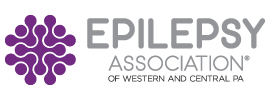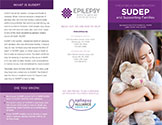
 Donate Now!
Donate Now!
 Donate Now!
Donate Now!

The Highmark Caring Place, A Center for Grieving Children, Adolescents and Their Families, is a safe place where grieving children and families can come together and be with others who understand what they’re going through. An essential community resource, the Caring Place offers services at no charge to grieving families from throughout the community.
If you are looking for a therapist to help you through your grief, you can search for one located near you on Psychology Today.
SUDEP Action is an organization based in the UK that is dedicated to: providing information on SUDEP and risk in epilepsy, offering support when someone has died, involving people to help effect change, sponsoring research and education to prevent future deaths, and capturing data across the UK & internationally through the Epilepsy Deaths Register.
The Center for SUDEP Research (CSR) is a National Institute for Neurological Disorders and Stroke (NINDS) funded Center Without Walls for Collaborative Research in the Epilepsies. This milestone-driven collaboration is composed of researchers from 14 institutions across the United States and Europe and brings together extensive and diverse expertise to tackle Sudden Unexpected Death in Epilepsy (SUDEP).
The CSR’s scientists and physicians are investigating SUDEP with their expertise in molecular biology, genetics, histopathology, electrophysiology, brain imaging, data analysis, and more. The team will identify the molecular and structural brain abnormalities underlying SUDEP, utilize these discoveries to identify features that could predict and identify those at risk of SUDEP, and hone in on those targets for the development of potential therapeutic interventions.
Overall, this investment by NINDS over nearly five years promises to catalyze research on SUDEP and dramatically enhance our understanding of this poorly understand and devastating phenomenon.
The North American SUDEP Registry (NASR) is an international group of collaborating researchers dedicated to uncovering the risk factors, causes, and mechanisms of SUDEP so that we may improve future epilepsy treatment and SUDEP prevention. The North American SUDEP Registry documents and analyzes cases of SUDEP so that we may illuminate its risk factors and causes and develop preventative measures. They facilitate the donation of DNA and brain tissue of those who have suffered from SUDEP; research on DNA and brain tissue can give us important genetic, neurophysiological, and other information.
STOP SUDEP RESEARCH PROGRAM is a genetic repository and molecular research on SUDEP mechanisms and risk factors. The investigators at the Department of Neurology at Baylor College of Medicine are actively recruiting patients who died due to SUDEP and families who lost a family member due to SUDEP. The investigators are collecting tissues and clinical information for a research study with the ultimate goal to develop treatments and interventions that will prevent SUDEP.
The Sudden Death in the Young (SDY) Case Registry gathers information to learn more about young people who die suddenly and unexpectedly. Babies, children and young adults up to age 20 are included in the SDY Case Registry. It has been hard for death investigators to find the causes for many sudden deaths in young people. It has also been hard for public health agencies to count the true numbers of these deaths. This means that doctors, scientists and families really do not have a good understanding of how often these deaths happen and what causes these deaths, which makes it more difficult to prevent more deaths like these.
 SUDEP and Supporting Families
This brochure was written to help funeral home directors and staff learn about
SUDEP and other epilepsy-related causes of death, as well as introduce the
support that is available through the EAWCP for families who have lost a loved
one. Print copies of this resource are available upon request.
SUDEP and Supporting Families
This brochure was written to help funeral home directors and staff learn about
SUDEP and other epilepsy-related causes of death, as well as introduce the
support that is available through the EAWCP for families who have lost a loved
one. Print copies of this resource are available upon request.
 Epilepsy and Grief
This rack card is available to funeral homes and other organizations that
provide support to families grieving the loss of a loved one with epilepsy. The
card provides contact information for the EAWCP and a list of ways that we can
help. Print copies of this resource are available upon request.
Epilepsy and Grief
This rack card is available to funeral homes and other organizations that
provide support to families grieving the loss of a loved one with epilepsy. The
card provides contact information for the EAWCP and a list of ways that we can
help. Print copies of this resource are available upon request.
Citizens United for Research in Epilepsy (CURE), is the leading nongovernmental agency fully committed to funding research in epilepsy. CURE’s mission is to find a cure for epilepsy, by promoting and funding patient-focused research. CURE has funded research projects that study SUDEP and the results from those projects are available on CURE’s website.
Founded by Mike and Mariann Stanton in January 2010 after the death of their four-year-old son Danny, the Danny Did Foundation works toward its mission to prevent deaths caused by seizures with these main goals in mind: advancing public awareness of Sudden Unexpected Death in Epilepsy (SUDEP), enhancing the SUDEP communication model between medical professionals and families afflicted by seizures, and the mainstreaming of seizure detection and prediction devices that may assist in preventing seizure-related deaths.
The mission of the Emma Bursick Memorial Fund (EBMF) is to promote public awareness about epilepsy and SUDEP, and to promote and support research into the cause and prevention of SUDEP. The EBMF currently supports: SUDEP research, emergency medication assistance programs, community outreach, trainings for health care providers and professional organizations, and grants for seizure movement detection monitors. The EAWCP Emma’s Gift program is supported by the EBMF.